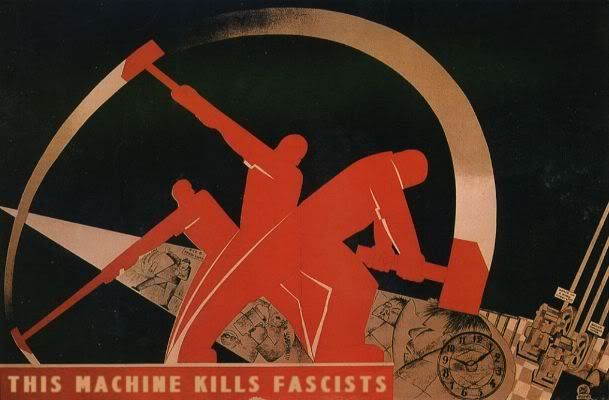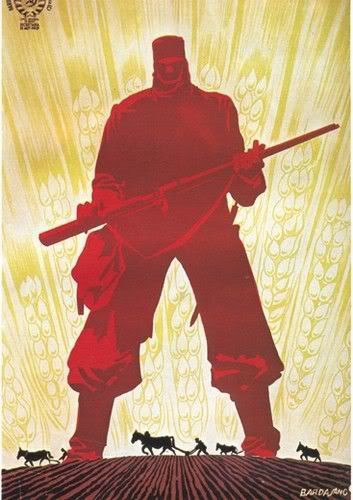Fifteen Years of "Free-Market Paradise"
Our government, media, and other “free-market” propagandists tell us that capitalism is the economic system that works-- that it has given us prosperity and allows us to realize our true potential as individuals. Communism, on the other hand, is deemed inherently undemocratic and totalitarian. It is portrayed as the ideological cousin of Fascism or Nazism, and is said to represent the elimination of all personal freedoms and the concentration of all political power in the hands of the state. All of these vulgar attacks are used to foster a knee-jerk reaction against communism. People are trained to shake with indignation at the mere utterance of any viewpoint even slightly apologetic to the communist cause, and to use Red-baiting to dismiss any rational, critical discussion of the real problems of capitalist society. Thus, most people are unaware of the real achievements of communism, which brought land reform and a dramatic bettering of human services to hundreds of millions of people. The recent collapse of socialism in Eastern Europe and the Soviet Union, and the subsequent economic downturn that has characterized the past several years, presents us with a good opportunity to address these important issues.
This year marks the seventeenth anniversary of the fall of the Berlin Wall. This historic event was lauded as the beginning of a new era, in which free-market reforms and democratic change would bring economic prosperity and greater human freedom to the people of Eastern Europe. Yet despite well over a decade of capitalist rule, privatization and free trade have not only failed to improve the economic and social conditions of the region, they have brought about dramatic decreases in living standards for millions of people. In fact, all indicators of social well-being are quickly deteriorating--levels of malnutrition and starvation are rising sharply, life expectancy is falling, and infant mortality rates are offensively high. The new pro-capitalist governments are unable or unwilling to provide the adequate healthcare, social security, and welfare programs necessary to confront these growing problems.
According a recent U.N. study of nine countries in Eastern Europe and Central Asia, one-third of all children currently live below the national poverty line. Education, which under socialism was provided free of charge, is now too expensive for many, and fewer and fewer children are attending school. Widespread poverty has also forced many children to begin working at early ages to support their struggling families. Violent crime, prostitution, drug abuse and alcoholism have risen as a consequence of the rampant social and economic decay.
This extreme poverty and deprivation in Eastern Europe is a natural consequence of the market reform. Former state functions designed to provide people with a decent standard of living have been privatized or eliminated altogether. Whereas the extensive welfare-state of the U.S.S.R. provided everyone with basic necessities, many people of the post-Soviet world must now struggle daily to meet even their most basic needs. Although the Soviet system had serious problems that should not be overlooked, everyone was at least guaranteed adequate housing, education, and medical care. Privatization has greatly weakened this social safety net, and many formerly-free services have become prohibitively expensive.
The prospects for democracy have similarly been undermined by the capitalist restoration. Although the U.S.S.R. was an authoritarian, bureaucratic regime that was undemocratic in many respects, the country did practice forms of economic democracy and worker involvement that are virtually unheard of in Western society. Collective decision-making in the workplace, for example, was a progressive and important feature of the Soviet system, yet was completely destroyed in the drive towards capitalism. Democratically-controlled workers’ councils, women’s organizations, and youth federations also played important roles in political life, a fact completely ignored by anti-communist ideologues.
In reality, the true opponents of democracy are not those who fight to preserve the social gains that socialism brought to Eastern Europe, but rather those who seek to exploit the system for their own economic and political benefit. Russian president Boris Yeltsin, for example, was heralded by the Western press as a “democrat,” yet he disbanded the Russian parliament and every other representative body in the country, banned labor unions from all political activity, and abolished several left-wing newspapers. His actions were typical of those of many “reformist” presidents who took power after the collapse of the Soviet bloc. Despite their rhetoric, their loyalty is not to democracy, but to the capitalist dollar.
Capitalism has unequivocally created an economic race to the bottom in Eastern Europe and Russia. In their effort to attract foreign investment, governments must compete to offer the lowest wages and the fewest worker protections. They seek to abolish every institution that serves people’s needs but functions as a barrier to capitalist enterprise. Multinational corporations benefit hugely from this situation, while millions of people are forced into total poverty. This trend will not stop until people begin to understand the inherent faults of capitalism and recognize the real benefits of a socialism.



4 Comments:
Good post.
The capitalists take pride, in destroying the safety net, that was in Eastern Europe, in terms of jobs, healthcare and food.
Red Scare,
We need more! You bust onto the scene with two great posts and then disappear into the mist. Return to us :-)
-Nelson H.
Excellent post Comrade. I am very pleased to get accross people like you on blog sphere. I was very impressed by your profile and your publications in various left magazines and journals.
I am a member of the Communist Workers and Peasants Party of Pakistan. The link to my party dicussion forum are present in the links section of my blog. We have some 2,400 members, and you will be a valuable addition. I will read the reading you suggested as soon as possible. Currently, I am reading William Blum's 'Rogue State', and busy with my college exams.
Needless to say, we must work together to build a vibrant socialist movement all over the world again.
Long Live Revolutionary Proletarian Internationalism!
For the cause,
Umer
Sorry for double posting.
Few days ago, while searching on the internet, I came accorss this document 'The Social Costs and Consequences of the Transformation Process'. I don't agree with the conclusions of the author; nevertheless, it is very informative and instructive article that entails facts and figures about the cost endured by the people of the former socialist countries as free market paved its way into their lives.
Just google the name of the article and you will be able to find it.
In Solidarity,
U.
Post a Comment
<< Home